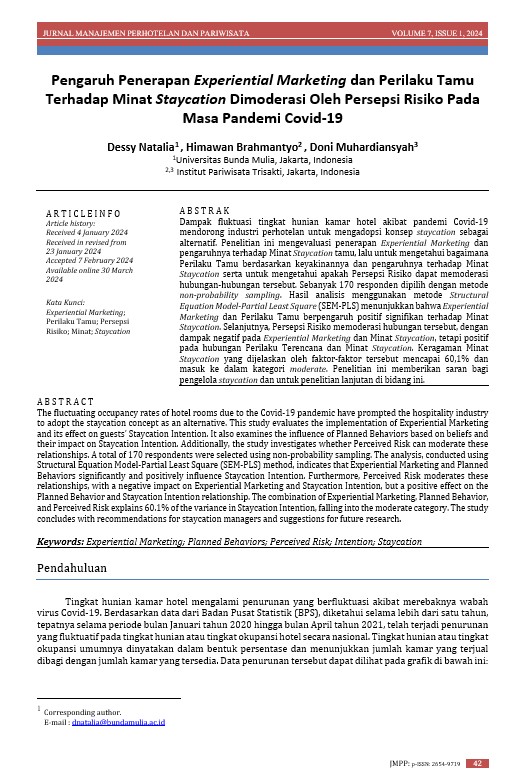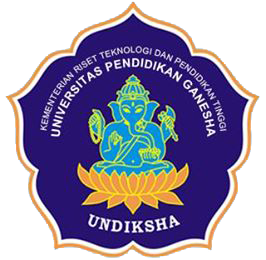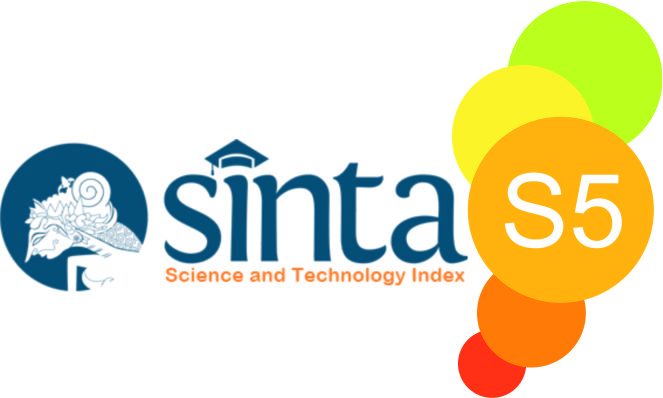Pengaruh Penerapan Experiential Marketing dan Perilaku Tamu Terhadap Minat Staycation Dimoderasi Oleh Persepsi Risiko Pada Masa Pandemi Covid-19
DOI:
https://doi.org/10.23887/jmpp.v7i1.73561Keywords:
Experiential Marketing, Perilaku Tamu, Persepsi Risiko, Minat, StaycationAbstract
Dampak fluktuasi tingkat hunian kamar hotel akibat pandemi Covid-19 mendorong industri perhotelan untuk mengadopsi konsep staycation sebagai alternatif. Penelitian ini mengevaluasi penerapan Experiential Marketing dan pengaruhnya terhadap Minat Staycation tamu, lalu untuk mengetahui bagaimana Perilaku Tamu berdasarkan keyakinannya dan pengaruhnya terhadap Minat Staycation serta untuk mengetahui apakah Persepsi Risiko dapat memoderasi hubungan-hubungan tersebut. Sebanyak 170 responden dipilih dengan metode non-probability sampling. Hasil analisis menggunakan metode Structural Equation Model-Partial Least Square (SEM-PLS) menunjukkan bahwa Experiential Marketing dan Perilaku Tamu berpengaruh positif signifikan terhadap Minat Staycation. Selanjutnya, Persepsi Risiko memoderasi hubungan tersebut, dengan dampak negatif pada Experiential Marketing dan Minat Staycation, tetapi positif pada hubungan Perilaku Terencana dan Minat Staycation. Keragaman Minat Staycation yang dijelaskan oleh faktor-faktor tersebut mencapai 60,1% dan masuk ke dalam kategori moderate. Penelitian ini memberikan saran bagi pengelola staycation dan untuk penelitian lanjutan di bidang ini
References
Ajzen, I. (2020). The Theory of Planned Behavior: Frequently Asked Questions. Human Behavior and Emerging Technologies, 2(4), 314–324. https://doi.org/10.1002/hbe2.195
BPS Provinsi DKI Jakarta. (2021). Provinsi DKI Jakarta Dalam Angka.
Cvelbar, L. K., & Ogorevc, M. (2020). Saving the Tourism Industry with Staycation Vouchers [version 1; peer review: 2 approved, 1 approved with reservations]. Emerald Open Research, 1–12.
Hair, J. F., Sarstedt, M., Hopkins, L., & Kuppelwieser, V. G. (2014). Partial least squares structural equation modeling (PLS-SEM): An emerging tool in business research. European Business Review, 26(2), 106–121. https://doi.org/10.1108/EBR-10-2013-0128
Han, H., Al-Ansi, A., Chua, B. L., Tariq, B., Radic, A., & Park, S. H. (2020). The Post-Coronavirus World in The International Tourism Industry: Application of The Theory of Planned Behavior to Safer Destination Choices in The Case of US Outbound Tourism. International Journal of Environmental Research and Public Health, 17(18). https://doi.org/10.3390/ijerph17186485
Hasan, M. K., Ismail, A. R., & Islam, M. F. (2017). Tourist Risk Perceptions and Revisit Intention: A Critical Review of Literature. Cogent Business and Management, 4(1). https://doi.org/10.1080/23311975.2017.1412874
Kontan.co.id. (2020). Sambil Atur Strategi, Hotel Santika Tetap Ikuti Arahan Pemerintah Terkait Corona. Kontan.Co.Id. https://industri.kontan.co.id/news/sambil-atur-strategi-hotel-santika-tetap-ikuti-arahan-pemerintah-terkait-corona
Küpeli, T. Ş., & Özer, L. (2020). Assessing Perceived Risk and Perceived Value in the Hotel Industry: An Integrated Approach. Anatolia, 31(1), 111–130. https://doi.org/10.1080/13032917.2020.1711785
Makawowor, C. C., & Dewantara, Y. F. (2023). Analisis Faktor yang Mempengaruhi Keputusan Menginap pada Generasi Milenial di Mercure Jakarta Sabang. Jurnal Manajemen Perhotelan Dan Pariwisata, 6(2), 334-341.
Nimri, R., Patiar, A., & Jin, X. (2020). The Determinants of Consumers’ Intention of Purchasing Green Hotel Accommodation: Extending the Theory of Planned Behaviour. Journal of Hospitality and Tourism Management, 45(November), 535–543. https://doi.org/10.1016/j.jhtm.2020.10.013
Oh, S. (2020). Singapore Helps Hoteliers with Staycation Stimulus. In Virginia Tech (Issue September). http://hdl.handle.net/10919/99976
Oktavia, R., & Sobari, N. (2021). The Influence of Customer Engagement in Customers’ Behavioral Intention on Staycation: The Experiential Marketing Perspectives Moderated by Health Risk and Financial Risk. Proceedings of the International Conference on Business and Engineering Management (ICONBEM 2021), 177, 244–251. https://doi.org/10.2991/aebmr.k.210522.032
Rather, R. A. (2020). Customer Experience and Engagement in Tourism Destinations: The Experiential Marketing Perspective. Journal of Travel and Tourism Marketing, 37(1), 15–32. https://doi.org/10.1080/10548408.2019.1686101
Rosanto, S., & Sari, N. R. (2021). Dampak Pandemi COVID-19 Terhadap Loyalitas Pelanggan pada Beverage Shop di Onezo Indonesia. Jurnal Hospitaliti dan Pariwisata, 2.
Same, S., & Larimo, J. (2012). Marketing Theory: Experience Marketing and Experiential Marketing. 480–487. https://doi.org/10.3846/bm.2012.063
Sofiani, & Octariana, V. (2022). Efektifitas Promosi Staycation Hotel Menggunakan Digital Marketing dalam Mempertahankan Tingkat Hunian Kamar di Masa Pandemi Covid-19. Destinesia: Jurnal Hospitaliti dan Pariwisata, 3(2), 61-67.
Sugiyono. (2010). Statistika Untuk Penelitian. CV. Alfabeta.
Yesawich, P. (2010). Are Staycations Here to Stay? The World Property Journal. https://www.worldpropertyjournal.com/us-markets/vacation-leisure-real-estate-1/real-estate-news-peter-yesawich-travel-trends-2010-travel-report-y-partnership-tourism-trends-orlando-theme-parks-disney-world-sea-world-universal-studios-2452.php
Yu, J., Lee, K., & Hyun, S. S. (2021). Understanding The Influence of The Perceived Risk of The Coronavirus Disease (COVID-19) on The Post-Traumatic Stress Disorder and Revisit Intention of Hotel Guests. Journal of Hospitality and Tourism Management, 46(January), 327–335. https://doi.org/10.1016/j.jhtm.2021.01.010










